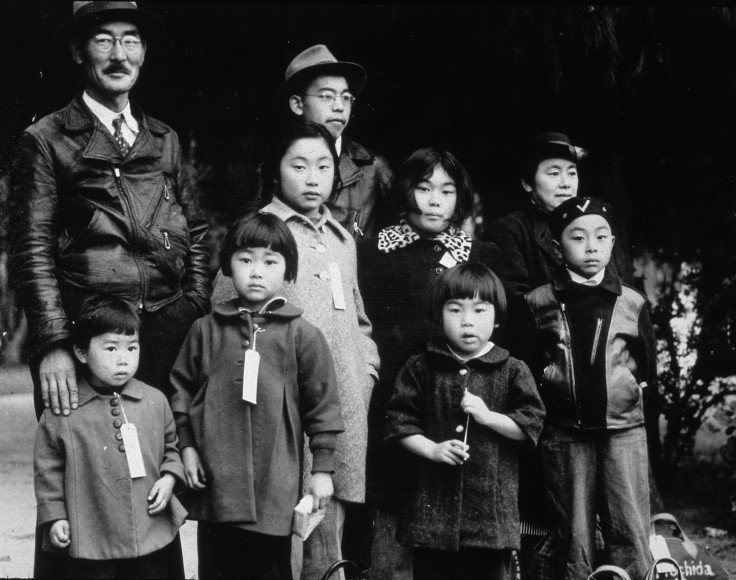Japanese Internment Anniversary: What Happened And Why Trump's Travel Ban Angers Civil Rights Groups 75 Years Later

Seventy-five years ago Sunday, in the wake of the December 1941 bombing of Pearl Harbor by Japanese imperial forces, former President Franklin D. Roosevelt signed an executive order that led to the forced relocation and detainment of over 100,000 Japanese-Americans. This year's solemn anniversary of Executive Order 9066 came at a turbulent time, as President Donald Trump fought U.S. courts to institute a travel ban on nationals of seven, Muslim-majority nations for national security purposes.
While anti-illegal immigration measures were a central campaign promise for Trump, Roosevelt was believed by many to have resisted such a broad command at first. But pressure built on the president, already in his third term in 1941, to expand on already existing orders mandating people of Italian, German and Japanese ancestry — the nations in the Axis powers of World War II — to register with the Justice Department and allow authorities to detain them arbitrarily. Anti-Japanese propaganda, often accompanied by racially insensitive depictions, had become prevalent in American media, and paranoia began to spread, causing some to question the loyalties of Japanese-Americans.
On Feb. 19, 1941, Roosevelt signed Executive Order 9066, evacuating at least 120,000 individuals of Japanese ancestry — the vast majority being U.S. citizens — and sending them to one of 10 internment camps located throughout the country.
The mass migration and forced relocation was believed to have deeply affected the traditional family structures of Japanese-American family households as younger, U.S.-born individuals, referred to as "nisei," were placed in charge of their elders by the so-called War Relocation Authority. Legal challenges to the executive order were brought all the way up to the Supreme Court, where it was ultimately upheld.
In 1945, the U.S. military dropped two atomic bombs on the Japanese cities of Hiroshima and Nagasaki, killing at least 225,000 people and ushering in the defeat of Japan in World War Two. That same year, the U.S. government began authorizing certain Japanese-Americans deemed loyal enough to the state to be returned to the West Coast. The popularity of anti-Japanese groups such as the Remember the Pearl Harbor League and Japanese Exclusion League that had supported the internment of Japanese-Americans had begun to decline by this time, and the last camp was closed in March 1946.
Japanese-Americans who experienced life in the camps have described it as harrowing, with close supervision by U.S. security forces, limited supplies shared by many and political divisions among prisoners. Even after leaving the camps, one former detainee recalled a feeling of "shame and guilt" among the ethnic community, according to NPR.
Efforts to compensate Japanese-Americans were authorized as early as 1948 with the Japanese American Evacuation Claims Act. The process turned out to be a largely disorganized and costly one, however, and the last act was not heard until 1965. Claimants also were forced to forego any future compensation. It wasn't until decades later that Ronald Reagan signed the 1988 Civil Liberties Act in which U.S. government formally apologized for the Japanese internment program and offered a sum of $23,000 to each surviving victim.
In recent months, critics of Trump's immigration policies have drawn comparisons with the internment of Japanese-Americans in the 1940s. Tom Ikeda, who founded an organization called Densho dedicated toward sharing the testimonies of incarcerated Japanese-Americans, told NBC News last month that Trump's travel ban was discriminatory toward Muslims and reminiscent of the way the U.S. government painted Japanese "as being morally suspect or potentially dangerous, unable to assimilate into American culture."
"What I believe is that we're seeing a similar repeat today in terms of the sensationalized claims against Muslims and what they're doing, how refugees from these particular countries are so dangerous when there's just no evidence of that," Ikeda said.
The Washington chapter of the Council on American-Islamic Relations, a vocal critic of Trump's travel ban, was scheduled to attend a remembrance ceremony of the Japanese-American internment program Saturday, according to Ikeda. The Japanese American Citizens League, which waged a decade-long, successful campaign to get the government to acknowledge its fault in relocating and imprisoning Japanese-Americans during the war, has also said it opposes Trump's executive order.
© Copyright IBTimes 2024. All rights reserved.








